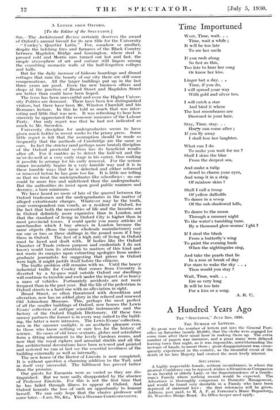A LETTER FROM OXFORD. [To the Editor of the SPECTATOR.]
Sin,—The Architectural Review certainly deserves the award of Oxford's annual biscuit for its new title for the University —" Cowley's Quartier Latin.- For, somehow or another,
despite the belching fires and furnaces of the Black Country between Magdalen Bridge and Carsington, where steel is pressed cold and Morris curs turned out hot and fast, the simple atmosphere of art and culture still lingers among the crumbling monastic walls of the half-forgotten colleges and halls.
But for the daily increase of hideous hoardings and dismal cottages that ruin the beauty of our city there are still some compensations. All the larger buildings put up in the last three years are good. Even the new business offices and shops at the junction of Broad Street and Magdalen Street are better than could have been hoped.
The terns has been uneventful and even the Higher Univer- sity Politics are dormant. There have been few distinguished visitors, but there have been Mr. Winston Churchill and his Romanes lecture. In this he told us much that was inter- esting and little that was new. It was refreshing to bear how sincerely he appreciated the economic measures of the Labour Party. Our only regret was that he bad not indicated as much to Mr. Snowden.
University discipline for undergraduates seems to have given much fodder in recent weeks to the penny press. Some little regret is felt that the assumption should be made so frequently that the methods of Cambridge are the same as ours. In fact the stricter (and perhaps more brutal) discipline of the Oxford proctorial system has its beneficial results after all. For it enables us to detect the half-wit and the ne'er-do-well at a very early stage in his career, thus making it possible to arrange for his early removal. For the serious sinner invariably begins in a very humble way and it is in these humble ways that he is detected and either reformed or removed before he has gone too far. It is little use telling us that we treat the undergraduates like schoolboys : no one could be more free and unfettered than the undergraduate. But the authorities do insist upon good public manners and decency, a bare minimum. We have heard no more of late of the quarrel between the Oxford tradesmen and the undergraduates in the matter of alleged extortionate charges. Whatever may be the truth, your correspondent can vouch, as a resident of Oxford, for the fact that both the necessities of life and the luxuries are in Oxford definitely more expensive than in London, and that the standard of living in Oxford City is higher than in most provincial towns. I could quote you many articles of merchandise which I buy always in London because the same objects (from the same wholesale manufacturer) cost me one or two or three shillings in the pound more if I buy them in Oxford. The fact of a high rate of living in Oxford must be faced and dealt with. If bodies like the Oxford Chamber of Trade (whose purpose and credentials I do not know) would turn its attention to matters of this kind and not waste its energies upon extracting apologies from under- graduate journalists for suggesting that prices in Oxford were high, it might justify itself before the citizens.
The traffic problem still remains with us. Until the heavy industrial traffic for Cowley that comes from Coventry is diverted by a by-pass road outside Oxford our dwellings will continue to tremble and rock under the impact of so heavy a nuiss of vehicles. Fortunately accidents are not more frequent than in the past year. But the life of the pedestrian in Oxford streets is a hard one with no alleviation in sight.
Broad Street, so often threatened with demolition and alteration, now has an added glory in the refaced and renewed Old Ashmolean Museum. This, perhaps the most perfect of all the smaller buildings of Oxford, now houses the Lewis E.vans collection of antique scientific instruments and the factory of the Oxford English Dictionary. Of these two uneasy partners the former is in every way suited to the build- ing, the latter a mere intrusion. The Lewis Evans' collection,
seen in the sunlight, is an aesthetic pleasure even to those who know nothing or care less for the history of science. Its cases of old brass sextants, globes and astrolabes form a fitting adornment to the lovely Carolean rooms, and now that the royal ciphers and armorial shields and all the fine architectural decorations have been re-Jawed and painted and restored we can at last see the essential loveliness of the building externally as well as internally. The new house of the Rector of Lincoln is now completed. It is without question a charming addition to the Turl, and in itself very successful. The fulfilment has proved better than the promise.
Our guests for Encaenia were as varied as they are dis- tinguished. But we were sadly disappointed by the absence of Professor Einstein. For this is not the first time that he has failed through illness to appear at Oxford. And Oxford laments the loss of such an opportunity to honour herself. We can only hope that the elusive professor will come later.—I am, Sir, &c., Your. OXFORD CORRESPONDENT.










































 Previous page
Previous page